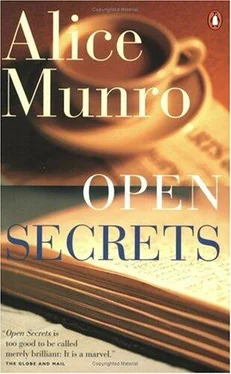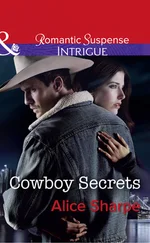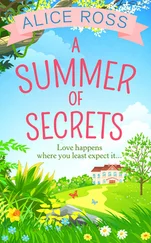He came back into the kitchen, and she made a face at him, raising her eyebrows and setting her lips blubbering as she listened to the voice on the other end of the phone. Then she went on describing things, commiserating, making her voice quiver with misery and indignation. Warren didn’t like watching her. He went around looking for their helmets.
When she had hung up the phone, she came and got him. “It was her,” she said. “I already told you what she did to me. She sent me to college!” That started them both laughing.
But Warren was looking at a bird in the mess on the floor. Its soggy feathers, its head hanging loose, showing one bitter red eye. “It’s weird doing that for a living,” he said. “Always having dead stuff around.”
“They’re weird,” Liza said.
Warren said, “Do you care if he croaks?”
Liza made croaking noises to stop him being thoughtful. Then she touched her teeth, her pointed tongue to his neck.
III
Bea asked Liza and Kenny a lot of questions. She asked them what their favorite TV shows and colors and ice-cream flavors were, and what kind of animals they would be if they could turn into animals, and what was the earliest thing they remembered. “Eating boogers,” said Kenny. He did not mean to be funny.
Ladner and Liza and Bea all laughed — Liza the loudest. Then Bea said, “You know, that’s one of the earliest things I can remember myself!”
She’s lying, Liza thought. Lying for Kenny’s sake, and he doesn’t even know it.
“This is Miss Doud,” Ladner had told them. “Try to be decent to her.”
“Miss Doud,” said Bea, as if she had swallowed something surprising. “Bea. Bzzz. My name is Bea.”
“Who is that?” Kenny said to Liza, when Bea and Ladner were walking ahead of them. “Is she going to live with him?”
“It’s his girlfriend,” Liza said. “They are probably going to get married.” By the time Bea had been at Ladner’s place for a week, Liza could not stand the thought of her ever going away.
The first time that Liza and Kenny had ever been on Ladner’s property, they had sneaked in under a fence, as all the signs and their own father had warned them not to do. When they had got so far into the trees that Liza was not sure of the way out, they heard a sharp whistle.
Ladner called them: “You two!” He came out like a murderer on television, with a little axe, from behind a tree. “Can you two read?”
They were about six and seven at this time. Liza said, “Yes.”
“So did you read my signs?”
Kenny said faintly, “A fox run in here.” When they were driving with their father, one time, they had seen a red fox run across to the road and disappear into the trees here. Their father had said, “Bugger’s living in Ladner’s bush.”
Foxes do not live in the bush, Ladner told them. He took them to see where the fox did live. A den, he called it. There was a pile of sand beside a hole on a hillside covered with dry, tough grass and little white flowers. “Pretty soon those are going to turn into strawberries,” Ladner said.
“What will?” said Liza.
“You are a pair of dumb kids,” Ladner said. “What do you do all day — watch TV?”
That was the beginning of their spending Saturdays — and, when summer came, nearly all days — with Ladner. Their father said it was all right, if Ladner was fool enough to put up with them. “But you better not cross him or he’ll skin you alive,” their father said. “Like he does with his other stuff. You know that?”
They knew what Ladner did. He had let them watch. They had seen him clean out a squirrel’s skull and fix a bird’s feathers to best advantage with delicate wire and pins. Once he was sure that they would be careful enough, he let them fit the glass eyes in place. They had watched him skin animals, scrape the skins and salt them, and set them to dry inside out before he sent them to the tanner’s. Tanning put a poison in them so they would never crack, and the fur would never fall out.
Ladner fitted the skin around a body in which nothing was real. A bird’s body could be all of one piece, carved of wood, but an animal’s larger body was a wonderful construction of wires and burlap and glue and mushed-up paper and clay.
Liza and Kenny had picked up skinned bodies that were tough as rope. They had touched guts that looked like plastic tubing. They had squished eyeballs to jelly. They told their father about that. “But we won’t get any diseases,” Liza said. “We wash our hands in Borax soap.”
Not all the information they had was about dead things: What does the red-winged blackbird say? Compan-ee! What does the Jenny wren say? Pleasa-pleasa-please, can I have a piece of cheese?
“Oh, can it!” said their father.
Soon they knew much more. At least Liza did. She knew birds, trees, mushrooms, fossils, the solar system. She knew where certain rocks came from and that the swelling on a goldenrod stem contains a little white worm that can live nowhere else in the world.
She knew not to talk so much about all she knew.
Bea was standing on the bank of the pond, in her Japanese kimono. Liza was already swimming. She called to Bea, “Come on in, come in!” Ladner was working on the far side of the pond, cutting reeds and clearing the weeds that clogged the water. Kenny was supposed to be helping him. Liza thought, Like a family.
Bea dropped her kimono and stood in her yellow, silky bathing suit. She was a small woman with dark hair, lightly grayed, falling heavily around her shoulders. Her eyebrows were thick and dark and their arched shape, like the sweet sulky shape of her mouth, entreated kindness and consolation. The sun had covered her with dim freckles, and she was just a bit too soft all over. When she lowered her chin, little pouches collected along her jaw and under her eyes. She was prey to little pouches and sags, dents and ripples in the skin or flesh, sunbursts of tiny purplish veins, faint discolorations in the hollows. And it was in fact this collection of flaws, this shadowy damage, that Liza especially loved. Also she loved the dampness that was often to be seen in Bea’s eyes, the tremor and teasing and playful pleading in Bea’s voice, its huskiness and artificiality. Bea was not measured or judged by Liza in the way that other people were. But this did not mean that Liza’s love for Bea was easy or restful — her love was one of expectation, but she did not know what it was that she expected.
Now Bea entered the pond. She did this in stages. A decision, a short run, a pause. Knee-high in the water, she hugged herself and squealed.
“It’s not cold,” said Liza.
“No, no, I love it!” Bea said. And she continued, with noises of appreciation, to a spot where the water was up to her waist. She turned around to face Liza, who had swum around behind her with the intention of splashing.
“Oh, no, you don’t!” Bea cried. And she began to jump in place, to pass her hands through the water, fingers spread, gathering it as if it were flower petals. Ineffectually, she splashed Liza.
Liza turned over and floated on her back and gently kicked a little water toward Bea’s face. Bea kept rising and falling and dodging the water Liza kicked, and as she did so she set up some sort of happy silly chant. Oh-woo, oh-woo, oh-woo . Something like that.
Even though she was lying on her back, floating on the water, Liza could see that Ladner had stopped working. He was standing in waist-deep water on the other side of the pond, behind Bea’s back. He was watching Bea. Then he, too, started jumping up and down in the water. His body was stiff but he turned his head sharply from side to side, skimming or patting the water with fluttery hands. Preening, twitching, as if carried away with admiration for himself.
Читать дальше













